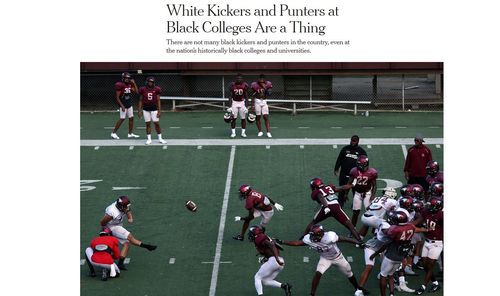


10/07/2018
I’ve long been covering this topic, but today from The New York Times:
White Kickers and Punters at Black Colleges Are a Thing
There are not many black kickers and punters in the country, even at the nation’s historically black colleges and universities.
By Marc Tracy Oct. 5, 2018 …
Just a handful of the specialists featured on the roughly two dozen H.B.C.U. [historically black colleges and universities] football teams in Division I identify as black. Many, like Delaware State’s punter and place-kicker, are Latino; others, like N.C. Central place-kicker Adam Lippy, are white. …
(Marquette King of the Denver Broncos, the most prominent black punter in the sport at any level, attended Fort Valley State University, a Division II H.B.C.U., before joining the Oakland Raiders as an undrafted free agent in 2012.)
There might be more Australian punters in pro and college American football than black punters.
The dearth of black kickers and punters is notable throughout Division I college football, where the majority of players are black, and in the N.F.L., where roughly two-thirds are.
It’s been this way for a while. An ESPN the Magazine article found that in 2010 just one of the 120 teams in college football’s top tier fielded a black kicker or punter in a game.
“You look at your demographics and the majority of your clients, and by all means I’d say the majority is white,” said Chris Sailer, who runs a popular kicking and punting camp. …
Javaunie Francis, a black punter at the H.B.C.U. Bethune-Cookman, posited that black athletes are disdainful of those positions. “A lot of black guys feel like, being a kicker or punter, you’re soft,” he said. “They don’t really want to do that type of stuff.”
It should be noted that people of all races have shared these sentiments.
But most black schools have track teams, who tend to feature strong-legged guys who don’t like tackle football, so why don’t sprinters do some punting in the fall?
Others point to socioeconomics, since poverty rates in many states are higher among African-Americans than other races, and honing the crafts of kicking or punting can require expensive personal coaching.
It’s a little hard to measure whether punters are getting better, but NFL placekickers definitely have consistently improved over the decades. One reason is guys like Chris Sailer of Notre Dame HS in Sherman Oaks, CA, who have made a career out of tutoring young placekickers.
Also, until recently, many colleges hoarded their full football scholarships for nonspecialists, so football players who came from families that needed financial aid had an incentive to play another position.
You could probably have a rule that punters and placekickers have to have played one or two downs at some other position in a game before they are allowed to kick.
This is an interesting example of how homogeneous African American culture is across this vast country. It’s not just that most blacks have turned against punting and placekicking, which remain important parts of one of the two favorite sports among African Americans, it’s that all African Americans across the whole country disdain punting and placekicking, with almost no regional variety.
If you told me that lots of blacks are anti-kicking but that, say, South Carolina blacks continue a fine tradition of coaching strong black kickers, well, that would make sense.
Except that it’s not true. As far as I can tell, there are no pockets anywhere in the country where blacks continue to work on punting or placekicking.
My guess is that in 1965 all-black schools like Grambling probably usually had decent punters and an occasional good placekicker, but that blacks failed to make the transition in the 1970s from old-fashioned straight-ahead placekicking to soccer-style sidewinding kicking. But what happened to their punting?